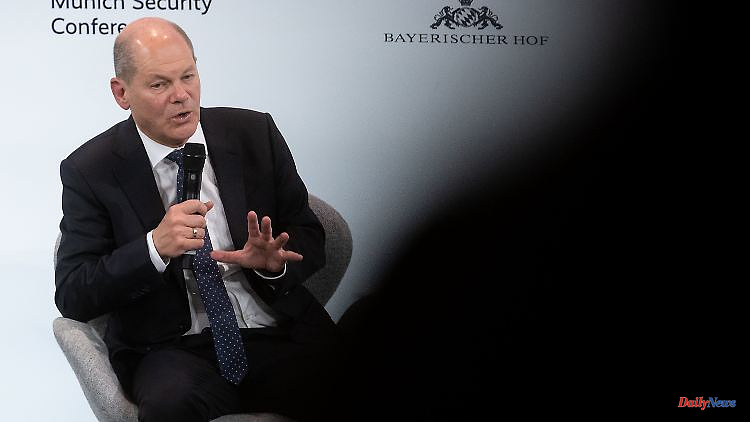Putin's revisionism will not win, says Chancellor Scholz at the Munich Security Conference. He does not answer questions about fighter jets for Ukraine. He hopes that the tanks will trigger a learning curve for Putin.
Chancellor Olaf Scholz used his appearance at the Munich Security Conference to once again explain his Ukraine policy. He showed understanding for the critics of arms deliveries, but made it clear that Germany and the West as a whole would support Ukraine "as extensively and for as long as necessary".
Scholz spoke immediately after the appearance of the Ukrainian President Volodymyr Zelenskyj and before the French President Emmanuel Macron. It was noticeable that the Chancellor listened to Zelenskyj's speech, but left the hall when Macron came onto the stage. Conversely, Macron had not previously viewed Scholz' performance.
Unlike Selenskyj, Scholz did not want to commit to the war ending this year. In a short conversation with the British journalist Christiane Amanpour after his speech, she asked him whether he shared Zelenskyj's expectations. Scholz answered evasively. He spoke all the more clearly about Russia's war aims: "It is still Russia's imperialist approach to conquer all of Ukraine or large parts of it."
When asked when he now expects the war to end, Scholz said it was wise to be prepared for a long war and it was wise to send the message to Putin "that we are ready to support Ukraine permanently to support". The Chancellor was convinced that the Western allies would continue to stand together. In Germany, despite all the criticism, there is broad support for his government's Ukraine policy. Macron later emphasized that the moment was "not the time for dialogue" because Russia had chosen war. "Russia must not win this war, the Russian attack must fail," said Macron.
Scholz also said in his speech that "Putin's revisionism" - that is, the Russian attempt to redraw the European borders - will not win. On the contrary: Ukraine is more united than ever, the European Union is united and NATO is growing.
Scholz emphasized that it was not the supply of weapons from the West that was prolonging the war. The opposite is true: "The sooner Putin realizes that he will not achieve his imperialist goal, the greater the chance that the war will end soon." At the same time, "we" - probably meaning the federal government, above all he himself - would strike a balance between the best possible support for Ukraine and the avoidance of an unwanted escalation. According to Scholz, he is happy that US President Joe Biden "and many other allies see it the same way I do".
Scholz thus implicitly represented the strategy shared by the USA of slowly increasing military support for Ukraine. This is intended to "cook the frog", as it is called in the USA - but so slowly that an escalation is avoided. The picture is a bit crooked: the slow cooking of the frog is intended to prevent it from jumping out of the pot; With regard to Putin, it should be avoided that he feels completely cornered and reacts with nuclear weapons. For Scholz, this strategy has the advantage that the public is also given the opportunity to slowly get used to more and more extensive support.
However, this approach is almost inevitably accompanied by the criticism that the West is acting too hesitantly. Referring to himself and Germany, Scholz rejected that. Despite all the pressure to act, the following applies: "Care before quick action, cohesion before solo performance."
Christiane Amanpour also took up this accusation. In the debate about tank deliveries, Scholz repeatedly said no and ultimately said yes. It was a "no, no, no, no, no - yes". Will he also say "no, no, no, no, no, yes" to the airplanes?
Scholz's answer left everything open: the question of aircraft is "not on the table, not on the agenda, there is no reason to discuss it," said the Chancellor, clearly annoyed. There is currently enough to do to ensure that the aid that has been decided on is actually delivered. At the end of January, Scholz had put a question about combat aircraft on an equal footing with the demand for western ground troops, which had never been raised.
The conversation with Amanpour was in English. When she asked him why he was having trouble collecting enough leopards from among the allies, Scholz slipped briefly into German: "Well." This question must be asked of others. In his speech he only indirectly pointed out that Germany was not responsible for the fact that not as many Leopard main battle tanks came together as originally expected for the Ukraine: he himself, Federal Defense Minister Boris Pistorius and Foreign Minister Annalena Baerbock would campaign intensively in Munich for " that everyone who can supply such battle tanks actually do so". Germany could take over the training of Ukrainian soldiers or support them with supplies and logistics. This is an example of "leadership" that everyone can expect from Germany, "and which I expressly offer to our friends and partners".
The delivery of the Leopard tanks will have "a concrete military effect," Scholz said in an interview with Amanpour, but the more important effect is that Putin learns that he miscalculated. The Russian President is betting that he only has to hold out long enough for the West to end its support. "That won't happen," said Scholz. Referring to the supply of ammunition to Ukraine, he said that the production of ammunition for Soviet-made tanks could be restarted, apparently referring to Eastern European countries as locations for the necessary facilities. "We are doing our best that a permanent supply of ammunition is feasible."












